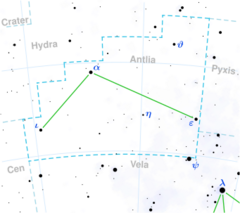Astronomy:Zeta1 Antliae
| Observation data Equinox J2000.0]] (ICRS) | |
|---|---|
| Constellation | Antlia |
| Right ascension | 09h 30m 46.09678s[1] |
| Declination | −31° 53′ 21.1911″[1] |
| Apparent magnitude (V) | 5.76[2] (6.20/7.01)[3] |
| Characteristics | |
| Spectral type | A0 V + A2 V[3] |
| U−B color index | +0.05[2] |
| B−V color index | +0.05[2] |
| Astrometry | |
| ζ1 Ant A | |
| Proper motion (μ) | RA: +19.044[4] mas/yr Dec.: −22.448[4] mas/yr |
| Parallax (π) | 9.3166 ± 0.0605[4] mas |
| Distance | 350 ± 2 ly (107.3 ± 0.7 pc) |
| ζ1 Ant B | |
| Proper motion (μ) | RA: +20.756[5] mas/yr Dec.: −21.530[5] mas/yr |
| Parallax (π) | 9.3970 ± 0.0529[5] mas |
| Distance | 347 ± 2 ly (106.4 ± 0.6 pc) |
| Details | |
| ζ1 Ant A | |
| Mass | 2.46[6] M☉ |
| Radius | 2.26[6] R☉ |
| Luminosity | 39.8[6] L☉ |
| Surface gravity (log g) | 4.1[6] cgs |
| Temperature | 9,641[6] K |
| Rotational velocity (v sin i) | 204[7] km/s |
| ζ1 Ant B | |
| Mass | 2.23[6] M☉ |
| Radius | 1.74[6] R☉ |
| Luminosity | 16.9[6] L☉ |
| Surface gravity (log g) | 4.3[6] cgs |
| Temperature | 8,872[6] K |
| Rotational velocity (v sin i) | 50[7] km/s |
| Other designations | |
| ζ1 Ant A: GC 13137, HD 82384, HR 3781, SAO 200445 | |
| ζ1 Ant B: GC 13135, HD 82383, HR 3780, SAO 200444 | |
| Database references | |
| SIMBAD | ζ1 Ant A |
| ζ1 Ant B | |
Zeta1 Antliae is the Bayer designation for a binary star[3] system in the southern constellation of Antlia. Based upon parallax measurements, the pair are located at a distance of roughly 350 light-years (110 parsecs) from Earth.[1] They have apparent magnitudes of +6.20 and +7.01 and are separated by 8.042 arcseconds.[3] The apparent magnitude of the combined system is +5.76,[2] which is bright enough to be seen with the naked eye in suitably dark skies.
The two system components A and B are both A-type main sequence stars,[3] hotter, larger, and more luminous than the Sun. The primary is spinning rapidly and the secondary relatively slowly.[7] The primary has a mass of 2.46 M☉, an effective temperature of 9,641 K, a radius of 2.26 R☉, and a bolometric luminosity of 39.8 L☉. The secondary has a mass of 2.23 M☉, an effective temperature of 8,872 K, a radius of 1.74 R☉, and a bolometric luminosity of 16.9 L☉.[6]
References
- ↑ 1.0 1.1 1.2 van Leeuwen, F. (November 2007), "Validation of the new Hipparcos reduction", Astronomy and Astrophysics 474 (2): 653–664, doi:10.1051/0004-6361:20078357, Bibcode: 2007A&A...474..653V.
- ↑ 2.0 2.1 2.2 2.3 Hurly, P. R. (1975), "Combined-light UBV Photometry of 103 Bright Southern Visual Doubles", Monthly Notes of the Astronomical Society of Southern Africa 34: 7, Bibcode: 1975MNSSA..34....7H.
- ↑ 3.0 3.1 3.2 3.3 3.4 Eggleton, P. P.; Tokovinin, A. A. (September 2008), "A catalogue of multiplicity among bright stellar systems", Monthly Notices of the Royal Astronomical Society 389 (2): 869–879, doi:10.1111/j.1365-2966.2008.13596.x, Bibcode: 2008MNRAS.389..869E.
- ↑ 4.0 4.1 4.2 Brown, A. G. A. (August 2018). "Gaia Data Release 2: Summary of the contents and survey properties". Astronomy & Astrophysics 616: A1. doi:10.1051/0004-6361/201833051. Bibcode: 2018A&A...616A...1G. Gaia DR2 record for this source at VizieR.
- ↑ 5.0 5.1 5.2 Brown, A. G. A. (August 2018). "Gaia Data Release 2: Summary of the contents and survey properties". Astronomy & Astrophysics 616: A1. doi:10.1051/0004-6361/201833051. Bibcode: 2018A&A...616A...1G. Gaia DR2 record for this source at VizieR.
- ↑ 6.00 6.01 6.02 6.03 6.04 6.05 6.06 6.07 6.08 6.09 6.10 Stassun K.G. (October 2019), "The revised TESS Input Catalog and Candidate Target List", The Astronomical Journal 158 (4): 138, doi:10.3847/1538-3881/ab3467, Bibcode: 2019AJ....158..138S.
- ↑ 7.0 7.1 7.2 Royer, F. et al. (January 2012), "Rotational velocities of A-type stars. I. Measurement of v sin i in the southern hemisphere", Astronomy and Astrophysics 381: 105–121, doi:10.1051/0004-6361:20011422, Bibcode: 2002A&A...381..105R.
- ↑ "IDS 09265-3127 AB -- Double or multiple star", SIMBAD Astronomical Object Database (Centre de Données astronomiques de Strasbourg), http://simbad.u-strasbg.fr/simbad/sim-id?Ident=HIP+46657, retrieved 2012-06-27.
 |


